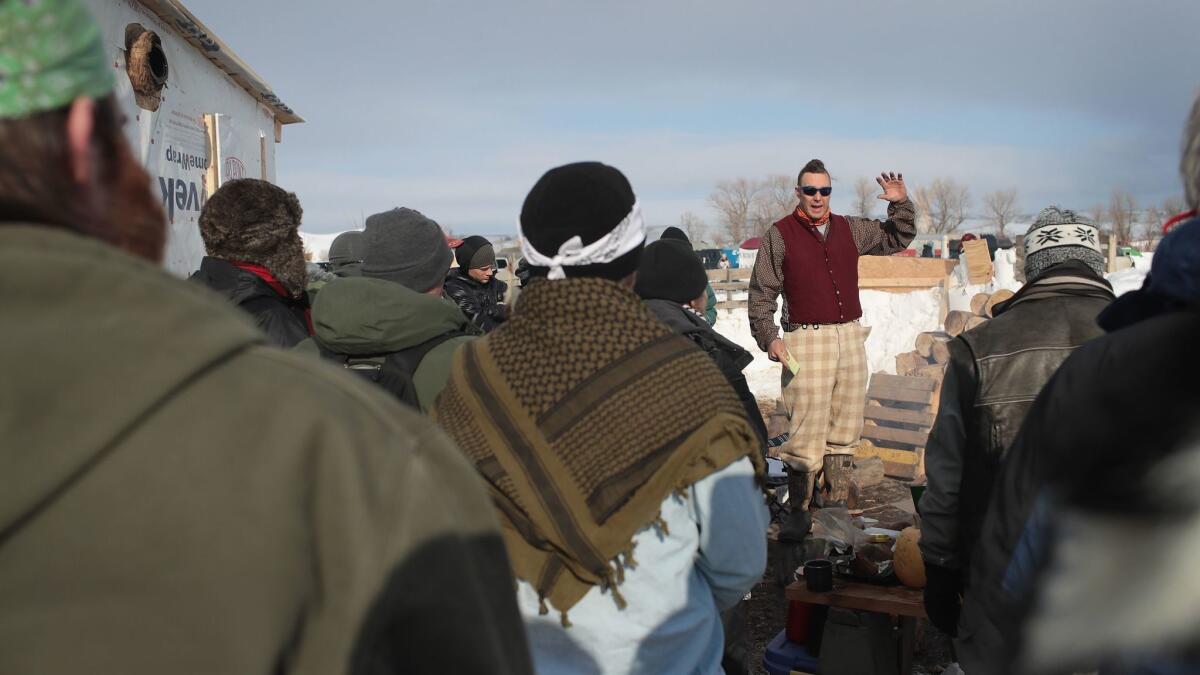Thousands of veterans converge on North Dakota to aid pipeline protest

- Share via
An estimated 2,100 U.S. military veterans were bound for the frigid Northern Plains on Saturday in a mass show of support for Native Americans and their allies battling the Dakota Access oil pipeline.
The vets, organized under the banner “Veterans Stand for Standing Rock,” include 219 vets from California, many of whom departed in seven charter buses on Friday.
For the record:
9:55 p.m. Dec. 3, 2016An earlier version of this article said that Army veteran Elizabeth Torrance served in Kosovo in 2004. She served in Iraq, in 2007.
“Here’s a chance to use my energy as a vet and as a Native American,” said Robin Gage, 60, a former member of the California National Guard who organized transportation for the California veterans. Her grandmother was a member of the Choctaw Nation, from Louisiana.
“Quite frankly, I don’t like bullies,” said Gage, referring to North Dakota’s deployment of militarized police against opponents of the 1,172-mile, $3.8-billion pipeline, which would transport up to 570,000 barrels of oil a day.
The pipeline is nearly finished but for a section under the Missouri River. Native opponents say an oil spill could contaminate water sources that serve them and some 17 million other Americans.
The Seven Council Fires Camp at the edge of North Dakota’s Cannonball River, just north of the Standing Rock Sioux reservation, has swelled to some 5,000 “water protectors” in recent weeks, and has received support from 300 tribes, along with many environmental organizations and climate change activists.
Gage predicted that far more than the estimated 2,100 veterans nationwide would come to Standing Rock.
“It’s history in the making,” said Kenny Nagy, a 64-year-old Vietnam veteran, dragging four duffel bags down a long corridor in Union Station before boarding the bus for North Dakota on Friday. “We’re going to be actually helping out people of the United States instead of corporations. I am so ready. The whole world is watching.”
Invoking the nonviolent protest tactics of Mohandas K. Gandhi and the Rev. Martin Luther King Jr., the veterans group pledged to peacefully support the unarmed protesters.
“In the ultimate expression of alliance, we are there to put our bodies on the line, no matter the physical cost, in complete nonviolence,” wrote the group’s in its “operations order.” The group added, “Our mission is to prevent progress on the Dakota Access Pipeline and draw national attention to the human rights warriors of the Sioux tribes.”
The veterans will “muster” at noon on Sunday at a high school gymnasium on the Standing Rock reservation, then “quickly form into platoons and companies” for anticipated confrontations on the front lines with several hundred state police, county sheriff deputies the North Dakota National Guard, and military vehicles originally designed for use in Iraq and Afghanistan. “We will likely be gassed, pepper sprayed, shot with rubber bullets, hit with batons,” said the order, adding, “It is critical that we demonstrate discipline, resolve and bravery. This is not an action of violence.”
The veterans’ effort drew criticism from the North Dakota Veterans Coordinating Council, which urged local vets not to join the protest.
The council doesn’t have an opinion about the pipeline, and it supports anyone who wants to protest peacefully.
Council president Russ Stabler told the Associated Press that the group worried that the veterans’ arrival could exacerbate an already tense situation. The group also accused the protesters of breaking laws, attacking law enforcement and destroying property, the AP reported.
Last week North Dakota Gov. Jack Dalrymple urged pipeline opponents to leave the encampment, citing his concern for their welfare in the extreme cold. The protesters rejected his plea, saying that North Dakota authorities did not appear concerned about hypothermia when drenching protesters with water hoses in subfreezing temperatures during a confrontation in late November.
Dalrymple also said he would suspend emergency services to the areas near the Seven Council Fires camp, including snow removal.
The U.S. Army Corps of Engineers ordered protesters to leave the camp by Monday, citing the building of unauthorized permanent structures on federal land. Protesters have insisted on their right to build the encampment on land covered by an 1851 treaty, in which the U.S. ceded the land to the Great Sioux Nation.
What will happen Monday is unclear. The protesters say they have no intention of leaving, and there appear to be no imminent plans to enforce evictions.
On Friday, U.S. Atty. Gen. Loretta Lynch placed calls to Morton County Sheriff Kyle Kirchmeier and Standing Rock Tribal Chairman David Archambault, and later released a statement urging “everyone involved to exercise restraint, to refrain from violence and to express their views peacefully.”
For the arriving veterans, though, their biggest foe may not be North Dakota’s police, but its brutal cold.
Temperatures at the camp are expected to dip below zero in coming days. Despite admonitions that veterans come prepared with subzero sleeping bags and other winter gear, the risk of exposure and hypothermia remains high.
California veterans bound for Standing Rock expressed readiness for the cold, and whatever else awaits them.
“As a veteran we take an oath to defend the American people against enemies foreign and domestic,” said Elizabeth Torrence, 30, an Army veteran who served in Iraq in 2007, as she prepared to board the bus in Union Station. “And the way they’re treating American people, unarmed people, is unacceptable.”
Tolan is a special correspondent.
ALSO
Green Party drops big for statewide Pennsylvania recount
Pressure builds to take down Utah’s ‘Zion Curtain’ liquor law
The ‘alt-right’ splinters as supporters and critics agree it was white supremacy all along
More to Read
Sign up for Essential California
The most important California stories and recommendations in your inbox every morning.
You may occasionally receive promotional content from the Los Angeles Times.













